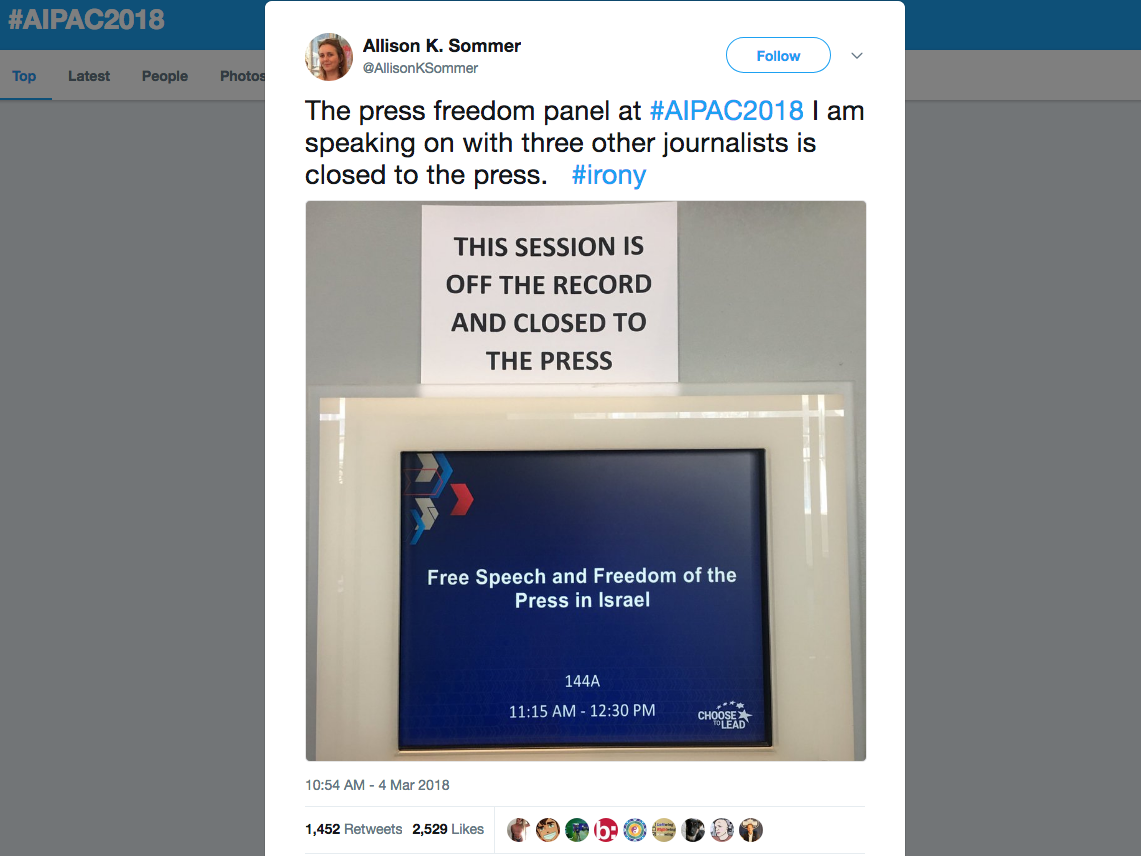Sunday afternoon, a picture taken at the annual policy conference of the American Israel Public Affairs Committee (AIPAC) in Washington, D.C., circulated online among a group of Jewish journalists. The photo was shot just outside the doors of a breakout session called “Free Speech and Freedom of the Press in Israel” at the mammoth American Jewish gathering. Just above the title, a separate placard read: “This session is off the record and closed to the press.”
The sheer dissonance of the two messages placed one after the other might have seemed funny if it didn’t underscore how strained conversations about Israel have become. And if you shuddered at the notion of banning the press from a conversation about press freedoms, you wouldn’t be wrong.
AIPAC has long had a strained relationship with the media when it comes to what does and doesn’t get reported at the pro-Israel lobby group’s policy conference. But things really came to a head at the conclusion of last year’s meetings, when the New York Jewish Week went public with what it deemed AIPAC’s unfair treatment of the press. “Unfortunately, though we were in attendance as members of the working media,” at the AIPAC meeting, the paper editorialized, “we are not able to provide insight on most of the more than 100 breakout sessions that took place because the great majority of them were closed to the press.”
READ: HAVE SOME JEWISH GROUPS GONE TOO FAR BY TRYING TO SILENCE THEIR OPPONENTS?
At last year’s conference, the Jewish Week estimated, “as many as three-quarters of each time slot’s sessions were off limits to the press.” During one of the rare sessions listed as open to the press, reporters were told a “mistake” had been made and escorted out of the room.
So this year, the Jewish Week stayed away. In an editorial released just days before the conference began (which wrapped up on Tuesday) – titled “Why we won’t be at the AIPAC conference” – the paper’s editors once again decried AIPAC’s policy of barring “members of the press from attending the great majority of breakout sessions” and its general attitude toward the media. It described how members of the press were forced to enter the convention through a separate entrance, how they were accompanied by staff, even to the bathrooms. And while the paper expressed some sympathy for conference speakers and panellists wary of how their opinions may be depicted in the press, it also pointed out the ridiculousness of trying to keep secrets in the age of social media and texts. (Not to mention at a conference attended by 20,000 Jewish professionals.)
The Jewish Week was right to call AIPAC to account for its questionable behaviour toward the press, and to wonder aloud whether “a more open approach” might even benefit an organization that regularly laments the way it is portrayed in the media. But its decision to not attend this year’s AIPAC conference, even in the limited capacities offered to journalists, might be a tactical error in the long run. By staying away – even for the right reasons – journalists may very well be playing into AIPAC’s hands. Who needs to bother with banning journalists if they’re not going to show up anyways?
